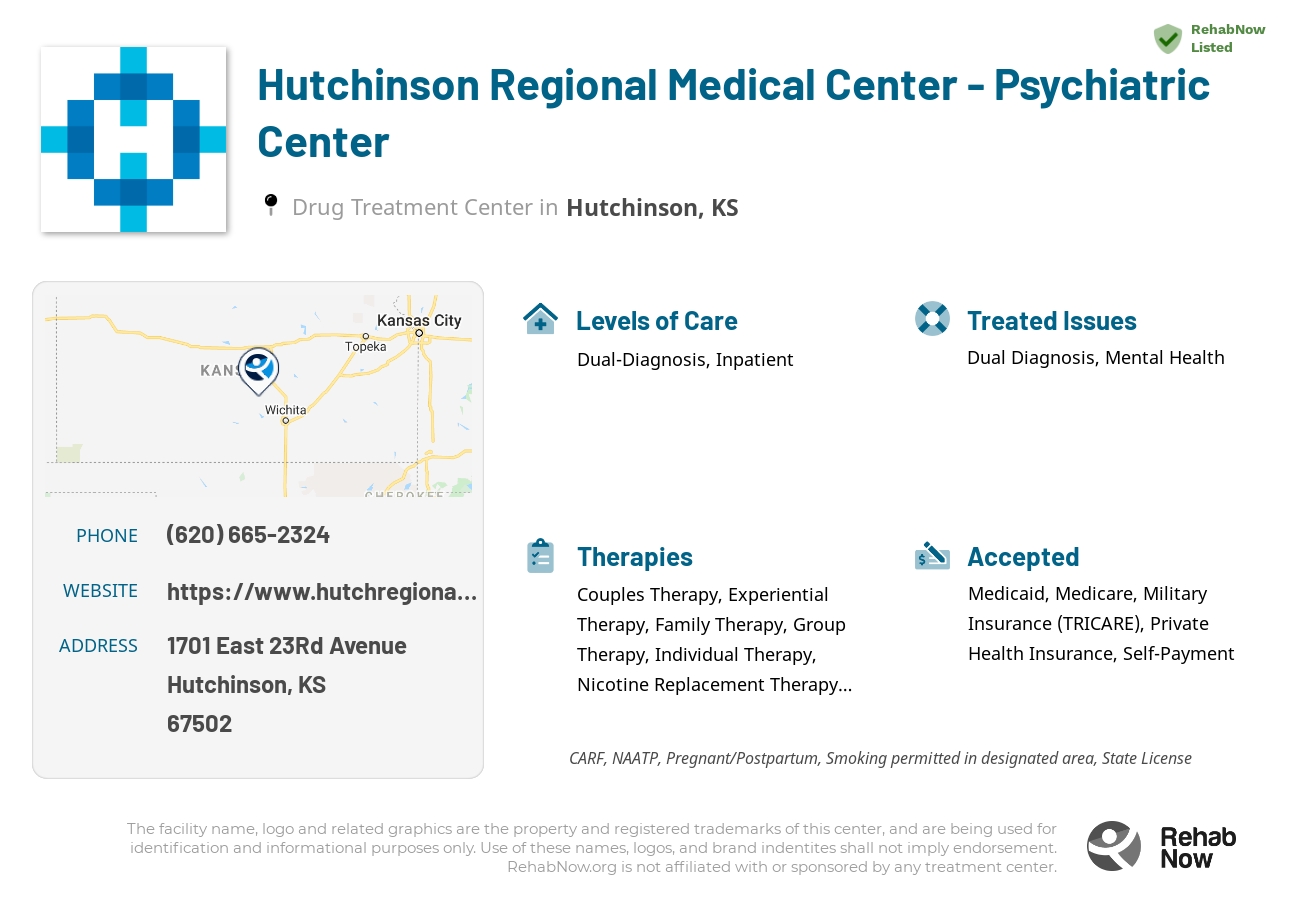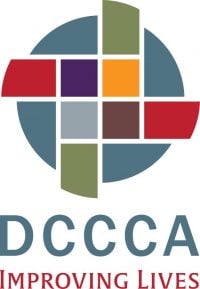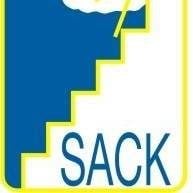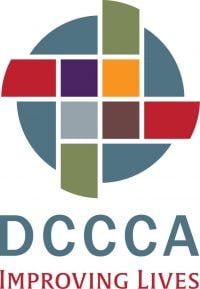Hutchinson Regional Medical Center - Psychiatric Center
Drug Rehab Center in Hutchinson, Kansas
Hutchinson Regional Medical Center - Psychiatric Center is a comprehensive psychiatric care facility that provides individualized care for individuals struggling with mental health issues, addiction, and substance abuse, and offers a variety of treatments, programs, and educational resources.
About Hutchinson Regional Medical Center - Psychiatric Center in Kansas
Hutchinson Regional Medical Center - Psychiatric Center is a comprehensive psychiatric care facility located in Hutchinson, Kansas. It provides comprehensive care for individuals struggling with mental health issues, including chemical dependency, substance abuse, and other behavioral problems. The facility is staffed with board-certified psychiatrists and a multidisciplinary team of professionals to provide individualized care and counseling. In addition, Hutchinson Regional Medical Center provides educational programs, crisis intervention, and a variety of psychotherapies to meet the needs of their patients.
Hutchinson Regional Medical Center - Psychiatric Center provides a wide range of treatments for addiction and substance abuse, including detoxification, inpatient and outpatient programs, and family therapy. Individual counseling is available for those struggling with addiction, and group therapy sessions are provided to address issues related to substance abuse and mental health. The facility also works closely with the medical staff to ensure patients receive the best care and treatment possible. In addition, Hutchinson Regional Medical Center provides addiction education and prevention programs and can offer referrals to appropriate community resources.
Hutchinson Regional Medical Center – Psychiatric Center has multiple accreditations, including Joint Commission on Accreditation of Healthcare Organizations, American Society of Addiction Medicine, and the American Psychological Association. The facility is also licensed by the state of Kansas and is internationally recognized. The center has been a recipient of the Gold Seal of Approval and the Hospital Consumer Assessment of Healthcare Providers and Systems (HCAHPS) Award.
Genders
Ages
Modality
Additional
Conditions and Issues Treated
A drug rehab center that uses Dual Diagnosis is more likely to be successful in rehabilitating a person. Dual diagnosis helps to identify and treat any co-occurring disorders. It is essential to screen for both addiction and any untreated mental health issues. A dual diagnosis gives rehab the means to treat addiction while restoring mental and emotional health.
About 70% of patients with drug addiction have at least one other psychiatric diagnosis. Fortunately, dual diagnosis treatment is a proven model that has been highly effective.
Levels of Care Offered
This center offers a variety of custom treatment tailored to individual recovery. Currently available are Dual-Diagnosis, Inpatient, with additional therapies available as listed below.
Inpatient rehab means you live there while your addiction or co-occurring disorder is treated. Prescribed medications are used along with counseling.
This type of rehabilitation provides a drug-free environment for people who struggle with chronic/long-term addiction (or their own home). Jobs or school can be put on hold until after the stay to focus solely on recovery.
Therapies & Programs
During individual therapy at Hutchinson Regional Medical Center - Psychiatric Center in , the person in recovery meets with a therapist one on one to go over their situation and learn from past mistakes. The counselor or therapist will use this time to address the causes of addiction, triggers, and any mental issue or dual diagnosis. They will also address aftercare plans, giving them the best chances of long-term sobriety.
This therapeutic process is very intense and challenging to go through. Some clients may find it easier to open up with someone apart from their family or loved ones who understand their struggles and experience with addiction.
The process of going through couple’s therapy at Hutchinson Regional Medical Center - Psychiatric Center in allows for both partners to be on the same page regarding addiction recovery. Whether one or both members of the couple struggled with addiction, they can improve their odds of sobriety by undergoing this treatment together. This therapeutic environment teaches how to communicate effectively and avoid relapse triggers while building healthy lifestyles that may help maintain sobriety following graduation from rehab programs.
Family therapy is designed to help addicts get clean and sober by using what they love the most; their family. Most drug treatment centers make it mandatory that the addict’s family attend therapy sessions, which is great because having everyone there to support them makes it much easier for them to get clean. Not only are they surrounded by people who want them to get better, but everyone is there because they want the best for them, not because they feel like they have to be.
Drug addicts are often surrounded by resentful or uneducated family members who would, at times, rather see them stay addicted because it makes their own lives easier. Sometimes they don’t understand what the addiction is or how they play a part in it. They know that during and after the addict’s sobriety journey, they will face challenges and changes that they aren’t sure how to handle. This can be very tough for an addict to go through on their own, which is why it’s so important that they have the support of their family. Just because someone is an addict does not mean that they don’t deserve the love and support of those around them.
Addicts in Hutchinson, KS can find support in group therapy at Hutchinson Regional Medical Center - Psychiatric Center by finding peers who understand their situation and being held accountable. They also learn to develop faith, understanding, and insight into their addiction through shared conversations.
Group Therapy is employed by drug treatment centers to provide the recovering addict with a platform to talk about their feelings and experiences. It also provides for an opportunity to learn from other addicts who have successfully overcome their addiction. It is recommended that all group members be recovering addicts for this type of therapy to work.
Trauma therapy allows people who struggled with a past trauma to face the situation and learn from it. Many people go through traumatic events at an early age that later leads them into addiction as adults. By addressing this issue during treatment at Hutchinson Regional Medical Center - Psychiatric Center in [/type], you can move forward with your recovery process and take back control of your sober future, too!
Traumas are one of the most common causes of psychological disorders such as Addiction Disorder. It’s often found among those diagnosed with Addictive Disorders because traumatized individuals have strong emotions or thoughts related to their traumas, leading to addictive behaviors.
Cognitive Behavioral Therapy (CBT) helps addicts comprehend the causes of their substance abuse and the consequences that follow. The treatment’s goal is to help addicts gain self-control and maintain abstinence from drugs and alcohol over the long term. Through CBT, clients learn to recognize and avoid high-risk situations and cope with challenging situations when they arise.
Nutrition therapy has been used as a treatment modality for addiction recovery and in eating disorders for adults, adolescents, and children. Specific nutrients have been identified that influence neurotransmitters associated with reward pathways of the brain. Carbohydrate loading with complex carbohydrates to elevate serotonin levels was effective in treating bulimia nervosa. This approach prompted researchers to explore the use of this type of nutritional intervention in other disorders.
Nicotine replacement therapy is a popular method of treatment that helps individuals overcome their addiction to cigarettes by providing them with safer alternatives. Nicotine replacement options can include:
- Inhalers
- Gum
- Patches
These treatments are often used in combination with other therapies, such as cognitive behavioral therapy or motivational interviewing, to help individuals more easily transition into a smoking-free lifestyle.
Patient Experience
Experiential Therapy at Hutchinson Regional Medical Center - Psychiatric Center
Experiential therapy is a type of treatment involving immediate, intense experiences designed to manage addiction. Experiential therapy is beneficial for:
- People who are seeking to overcome an addiction but have difficulty focusing on treatment goals
- People with short attention spans due to high levels of stress or difficulty concentrating
- People who are afraid of engaging in treatment due to negative past experiences
Payment Options Accepted
For specific insurance or payment methods please contact us.
Is your insurance accepted?
Ask an expert, call (888) 674-0062
Additional Details
Specifics, location, and helpful extra information.
Hutchinson, Kansas 67502 Phone Number(620) 665-2324 Meta DetailsUpdated November 25, 2023
Staff Verified
Hutchinson Regional Medical Center - Psychiatric Center Patient Reviews
There are no reviews yet. Be the first one to write one.
Hutchinson, Kansas Addiction Information
About 42% of adults in Kansas have tried an illicit drug at some point in their lives. 12.4% of the state population uses illegal drugs and 4.5% abuse alcohol in a given year. 15.16% of all deaths in Kansas between 2008 and 2017 were caused by either drugs or alcohol.
Treatment in Nearby Cities
- Osborne, KS (103.7 mi.)
- Goodland, KS (224.1 mi.)
- Leavenworth, KS (181.6 mi.)
- Hugoton, KS (199.4 mi.)
- Topeka, KS (137.4 mi.)
Centers near Hutchinson Regional Medical Center - Psychiatric Center
The facility name, logo and brand are the property and registered trademarks of Hutchinson Regional Medical Center - Psychiatric Center, and are being used for identification and informational purposes only. Use of these names, logos and brands shall not imply endorsement. RehabNow.org is not affiliated with or sponsored by Hutchinson Regional Medical Center - Psychiatric Center.











